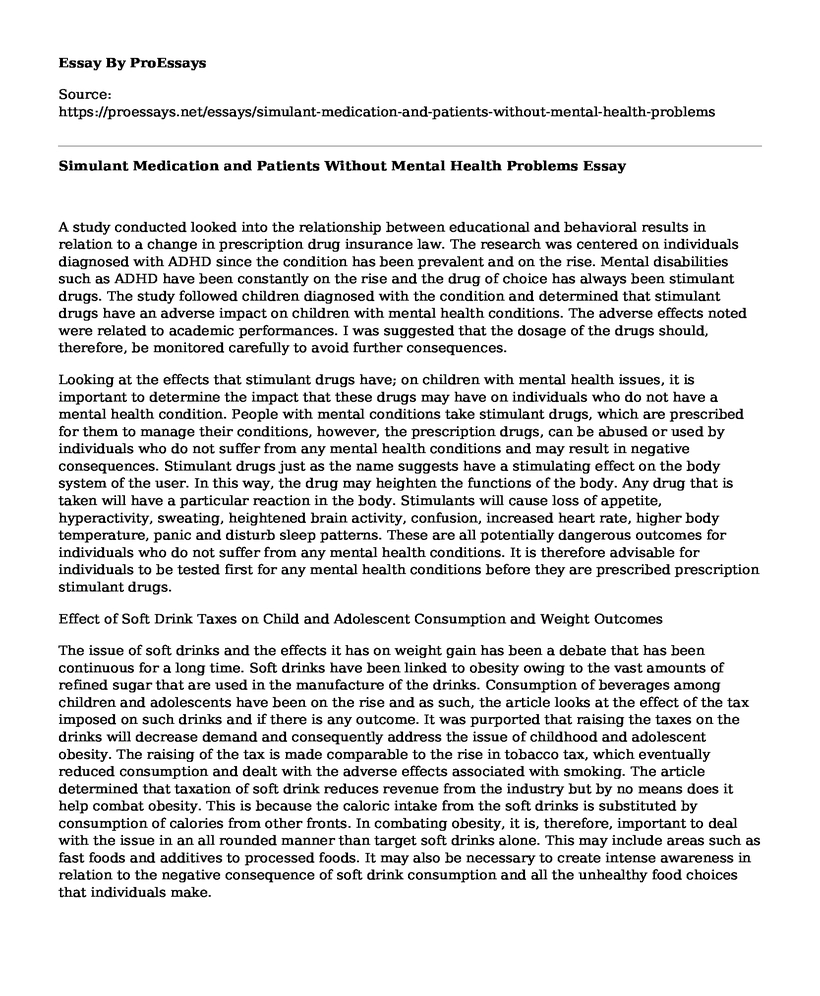A study conducted looked into the relationship between educational and behavioral results in relation to a change in prescription drug insurance law. The research was centered on individuals diagnosed with ADHD since the condition has been prevalent and on the rise. Mental disabilities such as ADHD have been constantly on the rise and the drug of choice has always been stimulant drugs. The study followed children diagnosed with the condition and determined that stimulant drugs have an adverse impact on children with mental health conditions. The adverse effects noted were related to academic performances. I was suggested that the dosage of the drugs should, therefore, be monitored carefully to avoid further consequences.
Looking at the effects that stimulant drugs have; on children with mental health issues, it is important to determine the impact that these drugs may have on individuals who do not have a mental health condition. People with mental conditions take stimulant drugs, which are prescribed for them to manage their conditions, however, the prescription drugs, can be abused or used by individuals who do not suffer from any mental health conditions and may result in negative consequences. Stimulant drugs just as the name suggests have a stimulating effect on the body system of the user. In this way, the drug may heighten the functions of the body. Any drug that is taken will have a particular reaction in the body. Stimulants will cause loss of appetite, hyperactivity, sweating, heightened brain activity, confusion, increased heart rate, higher body temperature, panic and disturb sleep patterns. These are all potentially dangerous outcomes for individuals who do not suffer from any mental health conditions. It is therefore advisable for individuals to be tested first for any mental health conditions before they are prescribed prescription stimulant drugs.
Effect of Soft Drink Taxes on Child and Adolescent Consumption and Weight Outcomes
The issue of soft drinks and the effects it has on weight gain has been a debate that has been continuous for a long time. Soft drinks have been linked to obesity owing to the vast amounts of refined sugar that are used in the manufacture of the drinks. Consumption of beverages among children and adolescents have been on the rise and as such, the article looks at the effect of the tax imposed on such drinks and if there is any outcome. It was purported that raising the taxes on the drinks will decrease demand and consequently address the issue of childhood and adolescent obesity. The raising of the tax is made comparable to the rise in tobacco tax, which eventually reduced consumption and dealt with the adverse effects associated with smoking. The article determined that taxation of soft drink reduces revenue from the industry but by no means does it help combat obesity. This is because the caloric intake from the soft drinks is substituted by consumption of calories from other fronts. In combating obesity, it is, therefore, important to deal with the issue in an all rounded manner than target soft drinks alone. This may include areas such as fast foods and additives to processed foods. It may also be necessary to create intense awareness in relation to the negative consequence of soft drink consumption and all the unhealthy food choices that individuals make.
Cite this page
Simulant Medication and Patients Without Mental Health Problems. (2021, Mar 08). Retrieved from https://proessays.net/essays/simulant-medication-and-patients-without-mental-health-problems
If you are the original author of this essay and no longer wish to have it published on the ProEssays website, please click below to request its removal:
- Maya Angelou Speech on Coretta Scott King
- Inquiry Methods in Aircraft Accidents Paper Example
- Essay Sample on Obesity Among Adults and Children in the United Kingdom
- Essay Sample on Tackling Stress: An Exercise in Mind-Boggling Research
- Research Paper on PCOS: Complex Pathophysiology and Diagnosis
- Research Paper on Intersectionality: Examining Multivariate Power Factors for Equal Health Outcomes
- Become a Teacher: Passion & Experience Teaching Children & Adults - Essay Sample







